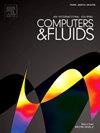平均网格自适应的高效CFD模拟与操作条件的变化
IF 2.5
3区 工程技术
Q3 COMPUTER SCIENCE, INTERDISCIPLINARY APPLICATIONS
引用次数: 0
摘要
当数值求解偏微分方程时,对于给定的问题和产生稳态的运行条件,网格自适应已经证明了其以低成本自动建立达到规定误差水平的离散化的效率。然而,随着工作条件的不断变化,例如在不确定性量化中遇到的情况,为每种情况调整网格并控制误差水平变得复杂且计算成本高。为了实现更有效的误差和成本控制,本工作提出了一种新的网格自适应方法。该方法包括建立一个单一的适应网格,旨在最小化连续一组操作条件的平均误差。在所提出的实现中,通过对局部平均插值误差的估计来迭代地构建单个网格。该方法利用网格自适应的迭代特性,通过重新采样蒙特卡罗正交,在减少的样本条件下获得准确的平均误差估计,确保了较低的计算成本。这种方法对于局部流动特征特别有效,其位置仅随操作条件而轻微变化,例如超音速流动中的运动激波,因为细化仅限于计算域的较小区域。研究的重点是评估该方法的平均误差收敛性、鲁棒性和计算成本,与最先进的自适应技术进行比较。此外,还评估了该方法对正交的选择和大小以及误差估计方法的敏感性。为此,将该方法应用于Burgers方程的一维变步长解和具有可变进口马赫数的二维欧拉超燃冲压发动机流动。结果表明,平均网格自适应(MMA)可以达到与特定网格自适应相当的误差收敛性,同时将评估成本降低了五倍(在超燃冲压发动机的情况下)。这种效率的提高源于减少了对采样条件数量的依赖,这要归功于鲁棒的蒙特卡罗重新采样,以及在多个评估中共享网格构建的计算费用。因此,所提出的方法能够提高计算效率,同时在规定的参数变化范围内保持跨不同操作条件的误差控制。本文章由计算机程序翻译,如有差异,请以英文原文为准。
Mean mesh adaptation for efficient CFD simulations with operating conditions variability
When numerically solving partial differential equations, for a given problem and operating condition producing a steady-state, mesh adaptation has proven its efficiency to automatically build a discretization achieving a prescribed error level at low cost. However, with continuously varying operating conditions, such as those encountered in uncertainty quantification, adapting a mesh for each condition and controlling the error level becomes complex and computationally expensive. To enable more effective error and cost control, this work proposes a novel approach to mesh adaptation. The method consists in building a single adapted mesh that aims to minimize the average error for a continuous set of operating conditions. In the proposed implementation, this single mesh is built iteratively, informed by an estimate of the local average interpolation error. The proposed method leverages the iterative nature of mesh adaptation by re-sampling Monte Carlo quadratures to obtain accurate average error estimates over a reduced set of sample conditions, ensuring a low computational cost. This approach is especially effective for localized flow features whose positions change only slightly with operating conditions, such as moving shocks in supersonic flows, as the refinement is confined to smaller areas of the computational domain. The study focuses on evaluating the method’s average error convergence, robustness, and computational cost in comparison to state-of-the-art adaptation techniques. Additionally, the sensitivity of the approach to the choice and size of the quadrature, as well as to the error estimation method, is assessed. For this purpose, the methodology is applied to a one-dimensional variable-step solution of the Burgers equation and a two-dimensional Euler scramjet flow with a variable inlet Mach number. The results show that Mean Mesh Adaptation (MMA) achieves error convergence comparable to specific mesh adaptation while reducing the evaluation cost by up to a factor of five (in the scramjet case). This efficiency gain stems from the reduced dependence on the number of sampled conditions, thanks to robust Monte Carlo re-sampling, as well as the shared computational expense of mesh construction across multiple evaluations. Therefore, the proposed method enables computational efficiency while maintaining error control across varying operating conditions within a prescribed parameter variation range.
求助全文
通过发布文献求助,成功后即可免费获取论文全文。
去求助
来源期刊

Computers & Fluids
物理-计算机:跨学科应用
CiteScore
5.30
自引率
7.10%
发文量
242
审稿时长
10.8 months
期刊介绍:
Computers & Fluids is multidisciplinary. The term ''fluid'' is interpreted in the broadest sense. Hydro- and aerodynamics, high-speed and physical gas dynamics, turbulence and flow stability, multiphase flow, rheology, tribology and fluid-structure interaction are all of interest, provided that computer technique plays a significant role in the associated studies or design methodology.
 求助内容:
求助内容: 应助结果提醒方式:
应助结果提醒方式:


